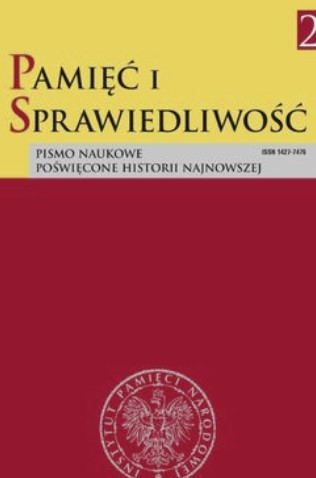Proces zjednoczeniowy PPR i PPS w latach 1945–1948 z perspektywy jugosłowiańskiej
The Unification Process of the Polish Workers’ Party and the Polish Socialist Party in 1945–1948 from a Yugoslav Perspective
Author(s): Mateusz SokulskiSubject(s): Political history, Government/Political systems, Political behavior, Comparative politics, WW II and following years (1940 - 1949), Post-War period (1950 - 1989), History of Communism
Published by: Instytut Pamięci Narodowej
Keywords: Polish Workers´ Party (PWP); Polish Socialist Party (PSP); Communist Party of Yugoslavia (CPY); Communism; unification; Sovietisation;
Summary/Abstract: Yugoslavia was a country in which the Sovietisation process ended the fastest among all the countries of Central and Eastern Europe. Yugoslav politicians treated Poland as the closest ally in Central and Eastern Europe, after Czechoslovakia and the USSR. They treated favourably the policy of the Polish Workers’ Party (PWP), which strived to absorb the Polish Socialist Party (PSP). Regardless of the faint support of the communists in Polish society, they argued that the PWP is enjoying greater and greater prestige among Poles, and its economic and international policy – unlike in 1918–1939 – is carried out in a rational manner. When Yugoslavia was expelled from the Cominform on 28 June 1948, politicians in Belgrade wanted to maintain their independence but also expressed their hope that they would succeed in the reconciliation with the countries subordinate to Moscow. In spite of the anti-Yugoslav campaign, which initiated the process of introducing Stalinism in Poland, the activity of the PWP for full domination of the political scene by this grouping would still meet with an approval. Only the break of relations with the countries of the Eastern bloc in the second half of 1949 led to a sharp conflict and actions to legitimate own regime in opposition to that imposed by the USSR. The party and diplomatic documents emphasised all the problems caused by the inept policy of the communists in the Eastern bloc, including Poland. Such actions were to deprecate the communist policy behind the “Iron Curtain.” In the case of Poland, they were publicised particularly strongly during periods of political crisis.
Journal: Pamięć i Sprawiedliwość.
- Issue Year: 32/2018
- Issue No: 2
- Page Range: 211-235
- Page Count: 25
- Language: Polish

